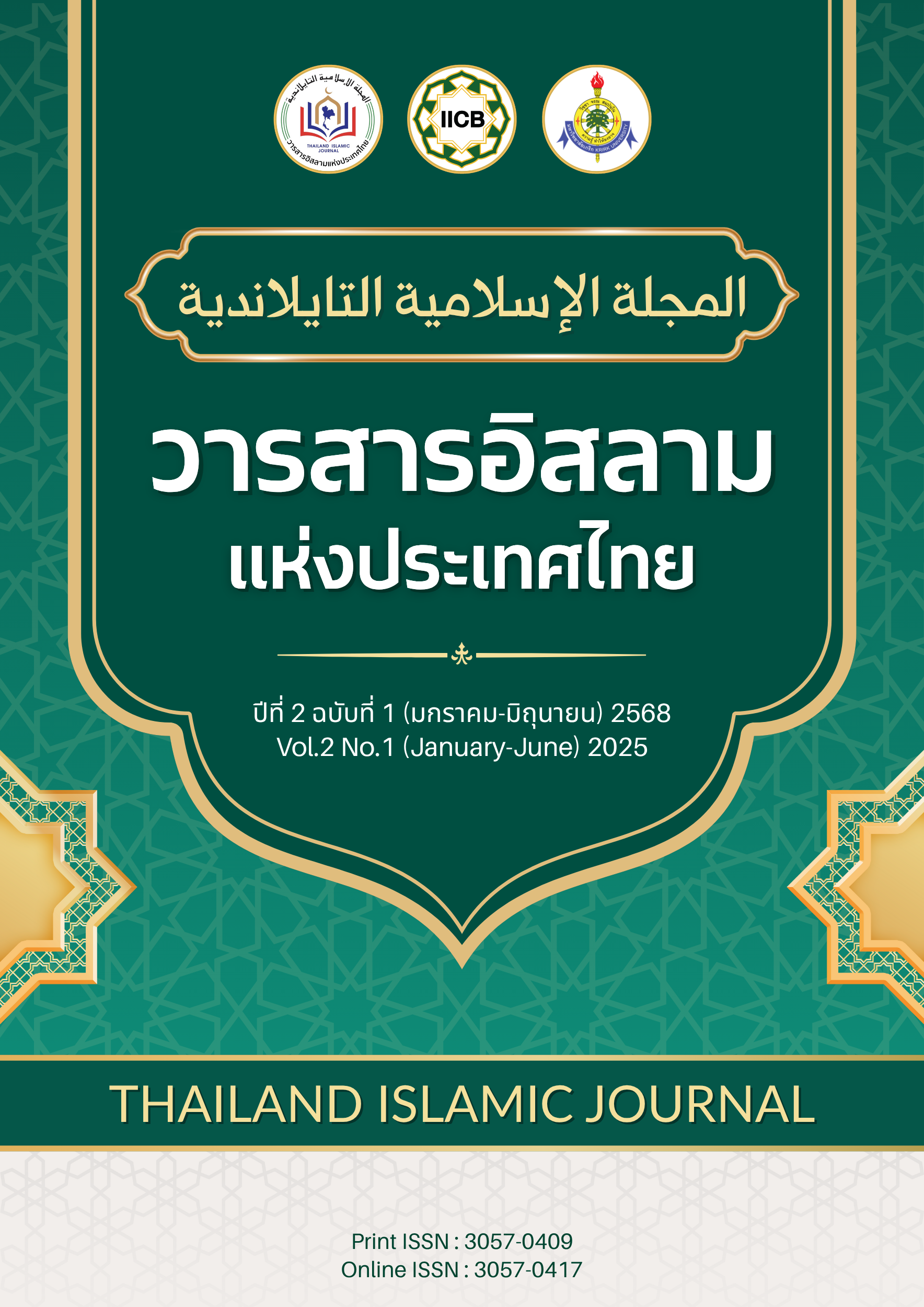Guidelines for Developing Standards for Exporting Halal Thai Poultry Products for Thai Entrepreneurs to Saudi Arabia After the Restoration of Thai-Saudi Relations
Keywords:
Export Standards, Poultry Products, Halal, Reestablish Relations, Saudi ArabiaAbstract
Abstract
This research was conducted with the following four key objectives: (1) to explore the various regulatory standards governing the export of poultry products from Thai enterprises to the Kingdom of Saudi Arabia, in accordance with Saudi import regulations (2) to investigate the halal production processes employed by Thai poultry producers for exports destined for the Saudi market (3) to analyze the opportunities, challenges, competitive advantages, and trade potential of Thai halal poultry products in Saudi Arabia; and (4) to develop strategic recommendations for enhancing Thailand’s halal poultry export standards to be fully aligned with Saudi Arabia’s import requirements.
The study adopted a qualitative research methodology, utilizing in-depth interviews with scholars, subject matter experts, and business operators who have experience exporting poultry products from Thailand to Saudi Arabia.
Moreover, this research underscores the importance of identifying emerging trade opportunities and leveraging Thailand’s unique product strengths—namely, its reputation for high-quality production and robust food safety practices. These elements can serve as key drivers in formulating a strategic framework for advancing the standards of Thai halal poultry exports, thereby enhancing their competitiveness in the global marketplace
References
บรรณานุกรม
กนกวรณ จันทร์อินทร์. (2556). การส่งออกผลิตภัณฑ์อาหารฮาลาลของไทย [วิทยานิพนธ์ปริญญามหาบัณฑิต, มหาวิทยาลัยมหาสารคาม]. http://repository.msu.ac.th/handle/11228/3883
กวี จงกิจถาวร. (2565, 9 กุมภาพันธ์). ความสัมพันธ์ไทย-ซาอุ มีมากกว่าที่คิด. ไทยพับลิก้า. https://thaipublica.org/2022/02/kavi-chongkittavorn09
ดวงพรรณ กริชชาญชัย. (2549). การบริหารจัดการโซ่อุปทาน: แนวคิดและการประยุกต์ใช้. สำนักพิมพ์มหาวิทยาลัยธรรมศาสตร์.
นกพัชร กอประเสริฐ, นิตยา งามยิ่งยง, กมลทิพย์ ทับทิม, ศศิตา ชาวนาตรี, & จุฑารัตน์ เพื่อมเสม. (2556). การจัดการโซ่อุปทานธุรกิจฟาร์มไก่เนื้อในจังหวัดกาญจนบุรี. คณะวิทยาการจัดการ มหาวิทยาลัยราชภัฏนครปฐม.
พิเศษพร วศวงศ์. (2566, 29 สิงหาคม). ฟื้นคืนความสัมพันธ์ไทย-ซาอุ ไทยได้อะไร และโอกาสของอุตสาหกรรม Healthcare. ไทยพับลิก้า. https://thaipublica.org/2023/08/nida-sustainable-move44
ภัทรพร สิริกาญจน. (2546). อิสลามศึกษาเบื้องต้น. โรงพิมพ์มหาวิทยาลัยธรรมศาสตร์.
มาลิก อับดุลบุตร, & ดวงใจชนก ทับทัน. (2563). การศึกษาการเชือดสัตว์ปีกฮาลาลของประเทศไทยตามข้อกำหนดของประเทศสหรัฐอาหรับเอมิเรตส์ (เอกสารวิชาการหมายเลข 64(2)-0312-030). สำนักพัฒนาระบบและรับรองมาตรฐานสินค้าปศุสัตว์ กรมปศุสัตว์.
ศุภลักษณ์ ตันติถาวร. (2559). อิทธิพลของปัจจัยศักยภาพและความท้าทายต่อการส่งออกสินค้าอาหารฮาลาลของไทยในตลาดโลก: กรณีศึกษาอุตสาหกรรมเนื้อสัตว์และสัตว์ปีก [สารนิพนธ์ปริญญามหาบัณฑิต, มหาวิทยาลัยมหิดล]. https://archive.cm.mahidol.ac.th/handle/123456789/1663
สาลิกา ค้าสุวรรณ. (2554). นโยบายส่งเสริมการส่งออกอาหารฮาลาลไทยและปัจจัยที่ส่งผลต่อภาพลักษณ์อาหารฮาลาลไทยในกลุ่มผู้บริโภคมุสลิมตะวันออกกลาง [วิทยานิพนธ์ปริญญามหาบัณฑิต, มหาวิทยาลัยกรุงเทพ]. http://dspace.bu.ac.th/handle/123456789/549
อารีย์, ศ. (2559, 13 พฤษภาคม). วิสัยทัศน์ซาอุดีอาระเบีย 2030 กับโอกาสของไทย. คมชัดลึก. https://www.komchadluek.net/news/227548
อริยา ส่งแสงชัย. (2559). การจัดการด้านการรับรองมาตรฐานอาหารฮาลาลที่ส่งผลต่อการสร้างความได้เปรียบทางการแข่งขันของผู้ประกอบการอาหารไทย [การค้นคว้าอิสระบริหารธุรกิจมหาบัณฑิต, มหาวิทยาลัยกรุงเทพ]. http://dspace.bu.ac.th/handle/123456789/2237
Downloads
Published
How to Cite
Issue
Section
License
Copyright (c) 2025 Internatinal Islamic College Bangkok, Krirk University

This work is licensed under a Creative Commons Attribution-NonCommercial-NoDerivatives 4.0 International License.
วารสารที่ได้รับการตีพิมพ์เป็นลิขสิทธ์ของวิทยาลัยนานาชาติอิสลามกรุงเทพ มหาวิทยาลัยเกริก
ข้อความที่ปรากฎในบทความแต่ละเรื่องในวารสารวิชาการเล่มนี้เป็นความคิดเห็นส่วนตัวของผู้เขียนแต่ละท่านไม่เกี่ยวข้องกับวิทยาลัยนานาชาติอิสลามกรุงเทพ และคณาจารย์ท่านอื่น แต่อย่างใด ความรับผิดชอบองค์ประกอบทั้งหมดของบทความแต่ละเรื่องเป็นของผู้เขียน




